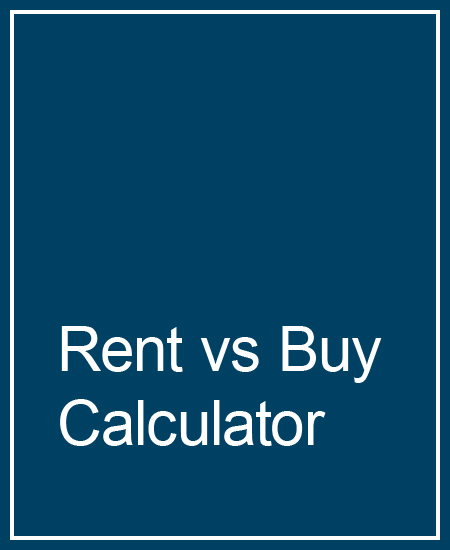Deciding whether to rent or buy a home is one of the most significant financial decisions you’ll make. While the dream of homeownership is compelling, renting can also offer valuable flexibility and financial benefits. To help you make the best choice for your situation, let’s break down the key factors to consider when weighing your options. Plus, we’ll show you how tools like our Rent vs. Buy calculator can inform your decision and simplify the process.
1. Financial Considerations
Monthly Costs: Renting may seem cheaper month-to-month, while homeownership comes with additional expenses, such as property taxes, homeowners insurance, and maintenance. Use the Rent vs. Buy calculator to compare these costs for your area and get a clearer picture of what you can afford.
Upfront Costs: Buying a home typically requires a significant upfront investment, including a down payment, and closing costs. On the other hand, renting usually involves a smaller financial commitment, like a security deposit and first — and sometime last — month’s rent.
Credit Score: A strong credit score is crucial for securing favorable mortgage rates. If your credit isn’t in great shape, renting might be the better short-term option while you work on improving it.
Investment Potential: Homeownership allows you to build equity and potentially benefit from property value appreciation over time, something we’ve seen a lot of in recent years. Renting doesn’t provide this financial growth, but it does free up cash that could be invested elsewhere.
Tax Benefits: Depending on where you live, owning a home may offer tax advantages, such as deductions for mortgage interest and property taxes. Factor these into your financial calculations with the calculator to see how they influence your overall costs.
2. Lifestyle Considerations
Flexibility: If you’re unsure about your long-term plans or anticipate relocating, renting offers more flexibility than buying. On the other hand, buying is ideal for those who plan to stay put for at least a few years.
Maintenance: Homeownership comes with the responsibility of maintaining your property, which can require both time and money. When you rent, your landlord typically handles these tasks, making it a more hands-off option.
Space Needs: Think about your current and future space needs. If you’re planning to grow your family or need a home office, buying might provide more options to meet those needs.
Personalization: Owning a home gives you the freedom to make upgrades and renovations, while rental properties often come with restrictions on customization. So you likely are stuck with the wall color and can’t install that cool light fixture you got at your favorite vintage store.

3. Market and Economic Conditions
Local Real Estate Market: Home prices and rent costs vary widely by location. In some areas, renting might be more affordable than buying, or vice versa. The Rent vs. Buy calculator can help you evaluate how these factors play out in your market.
Interest Rates: Mortgage rates significantly affect the cost of buying a home. Low rates, like we saw from 2010 to 2021, make buying more appealing, while higher rates may tip the scale toward renting.
Rent Trends: In areas where rents are rising rapidly, buying may offer more long-term financial stability. And just like the local real estate market, your local rental market will have trends and shifts. This depends on things such as apartment vacancy rate. It’s worth the time to do some rental market research in your area.
Economic Stability: Consider your own financial stability as well as broader economic trends. If your income is uncertain or the economy is in flux, renting may be the safer choice.
4. Future Goals
Long-Term Plans: If you anticipate major life changes, such as switching jobs, starting a family, or going back to school, renting allows for more flexibility to adapt.
Building Equity: Buying a home is often seen as an investment in your future, allowing you to build equity over time. Renting doesn’t offer this benefit, but it can free up resources for other investments.
Retirement Plans: Owning a home outright can provide financial security in retirement, while renting may mean ongoing monthly expenses well into your later years.
How the Rent vs. Buy Calculator Can Help
Deciding whether to rent or buy isn’t always straightforward. In addition to the above, there are also emotional factors. Owning a home can offer a sense of pride and stability, but it’s also a long-term commitment. Renting may be less stressful for those who prefer fewer responsibilities.
That’s why tools like the Rent vs. Buy calculator are so valuable. By inputting your financial details, such as monthly rent, potential home price, and estimated mortgage rate, you can get a clear comparison of costs over time, removing the financial questions in the decision making process, allowing you to focus on the lifestyle pros and cons.
This calculator also helps you account for factors like property appreciation, tax benefits, and maintenance costs, making it easier to see the full financial picture. Whether you’re leaning toward renting or buying, this tool provides data-driven insights to guide your decision.
Final Thoughts
The choice between renting and buying is personal and depends on your financial situation, lifestyle, and future goals. By carefully considering these factors and using resources like the Rent vs. Buy calculator, you can make a confident decision that aligns with your needs and aspirations. Whether you’re planning to rent or buy, understanding the trade-offs will help you take the next step toward your ideal living situation.



.jpg)